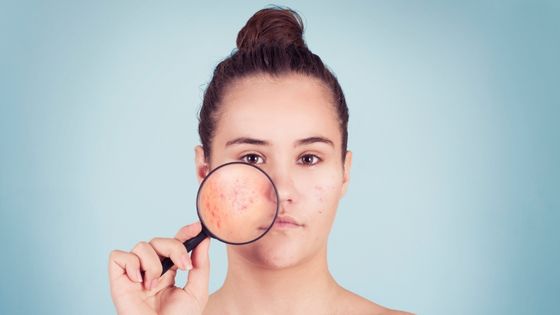Acne is the most common skin problem. Whenever you plan a party or photoshoot they appear from nowhere. The skin has tiny pores that get blocked with oil, dirt, bacteria, and dead skin cells. Due to this, the skin develops pimples. If the pimples appear often then the person may have acne issues. Acne is a type of skin condition that leads to pimples. It is a common problem and doesn’t cause any serious risk to the person. But this condition can be painful when a person has serious acne issues. Sometimes acne can also cause scarring. A person with acne issues can also get stress or other emotional issues. Acne can appear on any part of the body but it usually appears on the face. This skin condition can affect the self-confidence of a person which can lead to anxiety or depression.

Types of acne
Whiteheads: These are closed comedones, raised bumps under the surface of the skin. These whiteheads remain flesh-colored.
Blackheads: These are open comedones that occur on the surface of the skin. The dark appearance occurs due to the oxygen in the air.
Inflammatory lesions are the type of acne that can lead to scarring. Common inflammatory lesions are pustules, papules, nodules, cysts, etc.
Common symptoms of acne
Acne can appear on almost every part of the body. But most of the time, acne appears on the face, neck, back, chest, and shoulders.
- Pimples make the skin uneven and rough
- Skin discoloration like spots or dark patches
- Pain
- Tenderness
- Inflammation
- Swelling
You should not pop pimples with your hands as it can cause scarring.
Common causes of acne
Acne occurs when the skin pores are filled with dead skin, oil, or bacteria. Your skin pores open to the follicle which is made of hairs and oil glands. This gland releases sebum that travels up the hair. Sebum lubricates the skin and makes it soft. But sometimes the sebum can also cause acne when the follicles produce too much oil.
Risk factors for developing acne problems
- Hormonal changes
- Puberty
- Pregnancy
- Poor sleep
- Cigarette smoke
- Stress
- Cleansers or creams with high oil content
- Genes
- Certain medications like lithium, birth control, steroids, etc
Most people face acne issues during puberty. It is the time when the whole body faces lots of changes. These hormonal changes trigger the oil production that often leads to acne. If the acne appears due to puberty, the breakdown stops when the person reaches adulthood.
Certain food items increase the risks of acne breakdown like milk products. Consuming milk products like ice cream, milk can worsen acne conditions.
Treatment for acne
Treatment options for mild acne issues
Mild acne can be treated with OTC medications, creams, or cleansers. Various spot treatments and creams are available to apply on pimples after they pop up. These acne creams mainly include salicylic acid and benzoyl peroxide.
Treatment for moderate acne issues
If the OTC medication is not reducing acne issues then you may need acne treatment. Your dermatologist will prescribe you certain medications depending on the symptoms and causes of acne. These medications reduce acne breakdown and scarring. For moderate acne, your dermatologist may recommend antibiotics, retinoids, or prescription-strength benzoyl peroxide. Sometimes the doctor may also prescribe an antibiotic or hormonal birth control to reduce acne problems.
Treatment for severe acne
Your dermatologist may recommend a treatment that combines oral antibiotics, topical retinoids, benzoyl peroxide, topical antibiotics, etc. Your doctor may suggest birth control to treat acne. Accutane is a type of vitamin-A medication that is often used to treat nodular acne.
Homeopathy
Many people prefer homeopathy to treat acne. Look for homeopathic doctors New York and find the best treatment options for your acne issues. Your homeopath will ask some questions regarding acne breakdown and lifestyle and then prescribe the medications. Homeopathic medication depends from person to person. These medications will treat your acne problems without causing any kind of harmful side-effect.
Medical procedure for acne
Your doctor may prescribe certain medical procedures to treat acne breakdown and prevent scarring.
Dermabrasions: It is a type of exfoliation that removes the top layer of the skin using a rotating brush. This medical procedure is good for treating acne scarring.
Chemical peel: In this treatment, the doctor uses certain chemicals to remove the top layer of the skin to resolve the less damaged skin.
Photodynamic Therapy: This therapy includes medication and a special light to reduce oil production and bacteria.
Cortisone injections: These injections are used to reduce inflammation and increase healing speed. Cortisone is often used with other acne treatments.
Home remedies for acne
Lots of home remedies are also available to treat acne. Common home remedies for acne include:
- Honey mask
- Aloe Vera
- Tea tree oil
- Green tea, etc.
Before using anything on your face, apply it on the hand or back of the ears for a week. Apply it on your face only when you are not facing any irritation or rashes.
